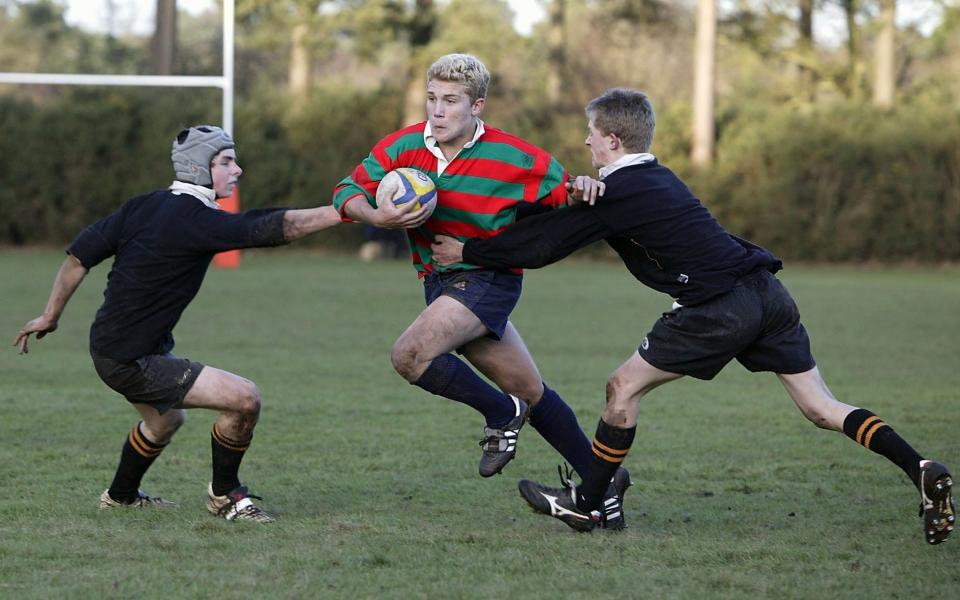
The legal tackle-height will drop to the waist for all rugby union below elite level from July 1 after the Rugby Football Union confirmed plans for a seismic change to the sport.
Following a unanimous vote from the RFU council, the governing body has moved to “reduce head impact exposure and concussion risk”. In doing so, it has triggered a backlash from amateur players.
As reported by Telegraph Sport last month, ball-carriers will also be “encouraged to follow the principle of evasion” and to “avoid late dipping”, with referees asked “to focus on the actions of the ball-carrier as well as the tackler when head contact occurs”.
The changes will apply across the community game in clubs, schools, colleges and universities at both age-grade and adult levels, from National One and below in the men’s game and Championship One and below in the women’s game.
‘The tackle will remain the primary method of stopping the ball carrier’
A similar initiative in France has been cited, although that also ruled that there could only be one tackler involved in any one contact. Telegraph Sport understands that, while this measure was considered by the RFU, two-person tackles will still be allowed from next season. This could increase the possibility of head-to-head contact between defenders, an outcome that will be monitored.
“Designed to improve player safety and informed by data, this change aims to reduce head impact exposure and concussion risk in the tackle for both the ball carrier and tackler,” read a statement on Thursday lunchtime, barely an hour after it was announced that over 55 amateur players have begun legal action against the RFU, the Welsh Rugby Union and World Rugby, accusing those authorities of negligence over brain injuries.
“Evidence from studies has consistently demonstrated that higher contact on the ball carrier and closer proximity of the ball carrier and tacklers’ heads are associated with larger head impacts, as measured by smart mouthguards, and an increased risk of concussion.
“Lowering the height of the tackle and encouraging the tackler to bend more at the waist will minimise the risk of this occurring, while maintaining the tackle as an integral part of the game.”
Some practicalities are yet to be determined. It has been suggested, for instance, that tacklers will be allowed to remain upright to make safe tackles on opponents that are picking and going close to rucks. There will need to be scrutiny, too, on players being loaned out from Premiership clubs to teams at level three and below, who will be playing under vastly different laws.
The RFU is determined to roll out the trial in line with comprehensive support for coaches, players and referees ahead of the 2023-24 season. This was not the case for their nipple-height tackle trial in the Championship Cup, which was halted at the start of 2019.
Nick Easter, the former England back-rower now coaching at Chinnor in National One, told The Times that a sport “struggling for numbers” was “going to rip away a lot of types of players from the game.”
French officials have been pleased with the progress of their own initiative and have reported a decrease in head injuries across the top two amateur divisions from 2018-19, before the tackle height trial, and 2021-22.
World Rugby chief executive Alan Glipin, meanwhile, welcomed the RFU “taking these proactive steps”. “Rugby will never stand still when it comes to player welfare and this is a prime example of the sport, once again, putting our words into action,” he said.
An RFU spokesperson explained how the law trial would be initiated. First steps will be implemented around the game this spring. “A multi-format programme of training and technical support will be put in place for players, coaches and match officials,” they said.
This will include face-to-face workshops, webinars, e-learning and video guidance. Training will be rolled out from the spring, through the summer and throughout next season. Constituent Body Coaching leads and Referee Societies will be invited to support the scheduling and roll out of this training.
“We understand this is a significant change and the game will have questions around the detail of the new law variation, what it means for coaches and players and how the tackle will be refereed during different phases of the game, for example close to the goal-line versus counter-attacks in open play.
“Detailed law application guidelines and training materials will be provided over the coming weeks for players, coaches and match officials to give clarity for the game. By making this decision now, the intention is to give the game time to prepare ahead of the new season.”
What are your thoughts on the new law change? Join the conversation in the comments section below
Article courtesy of
Source link